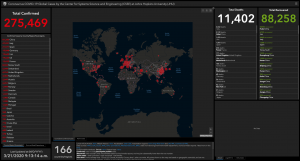Saturday 21 March 2020

There is no way I want a virus anywhere near these
One of the advantages of being a medic, especially when self-isolating, is that I spend an enormous amount of time reading. By force of circumstance I am becoming increasingly knowledgeable about Covid-19, which is not something you would normally expect of a surgeon.
It appears that certain groups of society believe that because the virus is unlikely to kill them, so they can be more cavalier. Look at Australia’s Bondi Beach only 24 hours ago or the Yorkshire Dales in England, where social distancing has recently been grossly flouted. Such behaviour places huge risk on the more vulnerable, a point that distance-flouters seem to miss. To see this behaviour has made me think. Why does anyone attend a gathering at all these days, be it social or professional? Manifestly those who do, simply do not understand, so perhaps I might explain.

I am not sure I agree with this Russian method of greeting
Let me start with the research, of which there is an increasing volume. There is a pile of work taking place on this new bug. The virus that causes Covid-19 is named SARS-Cov-2, and was only identified in January of this year, after the first cases appeared in China in December 2019. Yet there are already 1346 scientific papers published about the bug, from many different countries. At the moment, China leads the field.
When I read some of this research, of course I see a tragedy. Yet I also sense there is more to SARS-Cov-2 than pneumonia and the risk of death.
It starts with blood pressure, which is controlled in the human body by something called the renin-angiotensin system (RAS). This is essentially a sequential cascade of hormones. Renin is released from the kidneys into the blood stream. There it comes across something called angiotensinogen, which is released by the liver. Renin converts angiotensinogen to angiotensin I, which then becomes angiotensin II thanks to the activity of angiotensin-converting enzyme (ACE). Angiotensin II causes blood vessels to constrict, which puts up the blood pressure. This is why ACE inhibitors can be used to treat patients suffering from hypertension (high blood pressure).
That is the easy bit.
Now enter angiotensin-converting enzyme 2 (ACE2), which is an enzyme attached to cell membranes on the surface tissues of the lungs, arteries, heart, kidneys, and intestines. It has also been found on the tongue, mouth lining, pancreas, gall bladder, and even in the brain. Men watch out, you will find ACE2 in testicles as well. Inflammation of the male testicle was seen during the SARS outbreak in China in 2002 and 2003. For this reason, it has been suggested by some that men should undergo fertility checks after they have recovered from Covid-19. Cockerels can certainly be rendered infertile by a coronavirus.
ACE2’s job is to break down angiotensin II and convert it back to angiotensin I-VII. This causes blood vessels to dilate and down goes the blood pressure. ACE2 does the exact opposite of ACE.
The coronavirus that causes Covid-19 uses an ACE2 receptor as its main entry point into human cells. The original SARS virus, SARS-CoV, and which still exists to this day, also gains access to the human body that way. Logic thus decrees that anywhere containing ACE2 will be a weak point for virus entry.
Although many consider that SARS-Cov-2 only causes pneumonia and enters through the lungs, the virus has also been isolated in faeces and blood, implying multiple routes of transmission. We may have to worry about more than droplets from unprotected coughing and sneezing.
Into the mix comes mutation, as it appears the original Chinese virus has already mutated at least a dozen times. Consequently, what China has told us about its version of SARS-Cov-2 may not apply to the rest of the world. SARS-Cov-2 is what is called an RNA virus. This is a virus that has RNA as its genetic material and comprises a single or double strand of RNA. Other examples of RNA viruses are Ebola, rabies, influenza, common cold, hepatitis C, measles and SARS. A DNA virus, which this is not, is a virus that has DNA as its genetic material. This is usually double-stranded but can also be single-stranded. Examples of DNA-virus diseases include smallpox, herpes and chickenpox. When it comes to mutation, an RNA virus will mutate 100 times faster than a DNA virus.

The situation this morning – 21 March 2020 (courtesy Center for Systems Science and Engineering at Johns Hopkins University)
What is clear is that there is more to Covid-19 than pneumonia. Its effects are likely to be far more widespread and it is no respecter of age. So, if you think you are protected because you belong to a certain sector of society, think again. There are plenty of bits and pieces other than the lung that this virus can attack. Even if you survive, and the figures suggest you will, you may be left with lifelong problems.
Personally, I would not want a virus anywhere near my testicle, and I will stick to obsessive social distancing until the boffins can say more.
